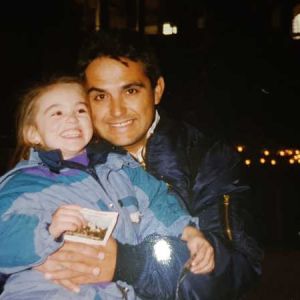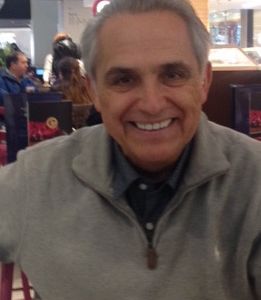I wanted the Yes to win anyway because I saw that the country was doing very well, making progress economically, in all social indicators, that the country was developing very well. And I compared it to the period before the military government when we were as poor as dogs. In reality, we were miserable. So, I saw the difference between one situation and another, but I also compared it to those three years of Allende’s government, which were terrible because people who lived through that time can tell you that they went hungry and often didn’t have much to eat, that they had to make do with whatever they could find in the stores. There was no future, the country was in a bad economic state, filled with violence, guerrillas, extremists who wanted to hasten the process, the socialist process, the revolution, and turn it into a civil war very soon. So, everyone was desperate.
And that period, I was a cadet at the Military School. That period was very, very bad for us because even though I was between 15 and 17 years old – I became a cadet from 15 to 17 years old – on one hand, we had to go out heavily protected and arrive home heavily protected because we were attacked by left-wing extremists, you know? It’s not that they attacked us with weapons, but when they saw a cadet, they would hit them, so we had to go out in groups and take buses that would leave us somewhat close to our homes. That was the left. But on the right, everyone treated us as if we were cowards, as if we were unable to defend the country, as if we saw that the country was completely subdued and on the verge of irreversible communism. And they would throw corn at us. So, we were completely alone, alone. All the military were alone, alone and very abandoned to the hands of God. So, when comparing it to the period we were already seeing in ’87, ’88, Chile had already experienced two economic crises under this military government, the one in ’74 was horrible, and the one in ’82 was worse. And despite that, you see that social indicators, poverty was decreasing. We were earning better wages, there was more stability, there were reforms that were and later became an example for the world. So, knowing that there could be revenge and we could return to a similar situation as before, and also because of the potential vendetta from the other side, I wanted the Yes to win. Anyway, that was my desire, I really wanted the Yes to win because I saw it as good for me and for the country, essentially.
That day, I was in charge of a local as a military chief, a location in Melipilla, and in Melipilla, the Yes won. I was in charge of a group of soldiers who guarded the location and ensured the internal security so that people could vote freely. It was a rather calm task because we occupied the location a couple of days before, closely monitored the installation of the polling stations, ensured that everything arrived at the Electoral Board. They and we primarily had the duty of safeguarding, of preventing disorder and crazy people from trying to do something, from trying to steal the ballot boxes. Essentially, we protected the security of the election, ensuring it was as clean as possible. And that’s what we did. I didn’t have any major problems. There were people who, when entering the location to vote, looked at us with a friendly face, and there were others who looked at us with a bit of resentment. But overall, no problems. Nothing. It all took place completely calmly. I was there in Melipilla. Do you know where Melipilla is? It’s outside. In Santiago, there were crowds and many people say they voted or not due to the incredible hours of waiting to vote. Everything wasn’t prepared for people to rush to vote, and people from both sides were affected. So, in Melipilla, as a good province, it was rather calm, and the Yes won, won by a small margin.
That night, when we learned the results, my military personnel were deeply saddened because, in general, everyone wanted to vote for the Yes. I remember a corporal who cried, cried because he was truly saddened. That was my experience with him. Then, we would have to give another opinion. What happened afterward? What do I think now? But at that moment, I was a fervent devotee of the Yes. Regarding the results, at that time it wasn’t like it is now, where everything is settled. The results had to be transported, they had to be taken to a place. They were collected at a school, and from there, they were dispatched. Despite everything, the results were announced late that night. I mean, it didn’t happen as it did at that time in other countries where they would give it to you three or four days later. No, the results were announced on the same day, it was estimated that they could be announced by around eleven o’clock at night, but they were announced at around midnight or close to one o’clock. The final results, with a high percentage. There was much regret, but nothing extraordinary happened. We returned to our units. I was at the War Academy, but there was a lot of concern, a lot of ink spilled because we hadn’t won, because we felt that the people, that the nation had behaved poorly towards the military government, we felt ungrateful.
We believed that people had been influenced by the propaganda. In no case did we think that democracy was coming; we thought a retaliatory government was coming, one that would first try to settle scores and then worry about democracy and everything else. We were scared. We blamed ourselves for not having conducted a good campaign, propaganda, a good campaign platform, for not being able to spread the message about all the work that had been done. Meanwhile, the other side had done so well, selling a calm, beautiful image of joy. So, we blamed ourselves for that. We also blamed ourselves for the triumphant attitude we had had. A lot. It was as if it were taken for granted, and it was a surprise that we didn’t win, although it wasn’t much: 53 against 44. Yes, but we still believed that the Yes side could win. So, there was a lot of regret, concern that gradually faded with time.
The next day, we had conversations among ourselves about how and why we had lost. We blamed the top leadership, those closest to Pinochet, thinking that they had deceived him about the reality of the voting situation. We believed they didn’t actually inform him of how things were so that he could prepare accordingly, to avoid the triumphant air that had caused us not to worry about the campaign, not to prepare to highlight all the achievements of the military government and everything else.
So, for a whole month, we, the military, were deeply affected, and it’s too late now. But in the campaign, you see, I wouldn’t have focused so much on revenge, on what communism would bring, on showing gray images of what the communists do. Because that ultimately scares, but it scares in the sense that it could actually happen to you, not just because someone tells you about it. Talking about murder. No, it’s not necessary. I would have done something different. I would have talked about topics that would truly show people how well things have been and how much better they can be. If you don’t tell people how well they are doing, people just assume that it’s the way it is. Especially the younger ones, those who are born into and grow up in this situation. So, the campaign for the Yes side was poorly presented, and for me, it was crucial because it lasted a month, and on the other side, without hatred or resentment, the joy was already present. Bright colors, beautiful people, you know. So, I think that was the main factor. If it hadn’t been 55 the other way around, it might have been even more so. That was a detail. A tactical detail with strategic repercussions.


